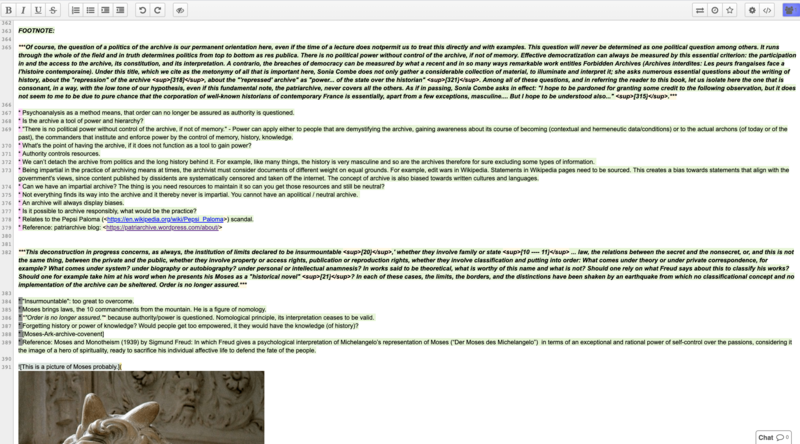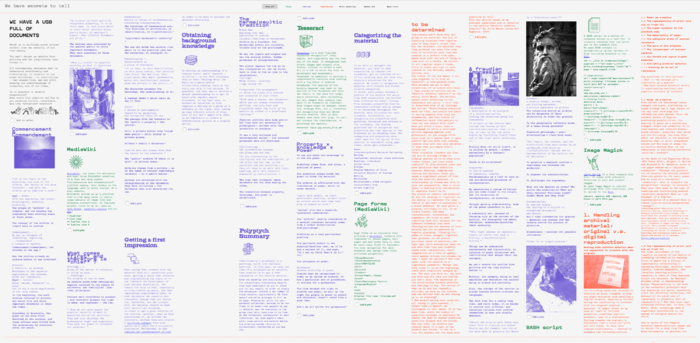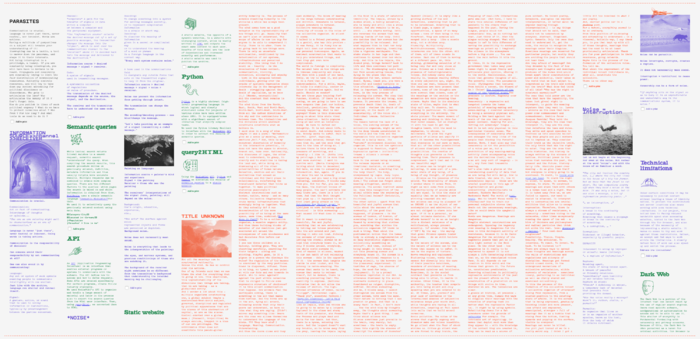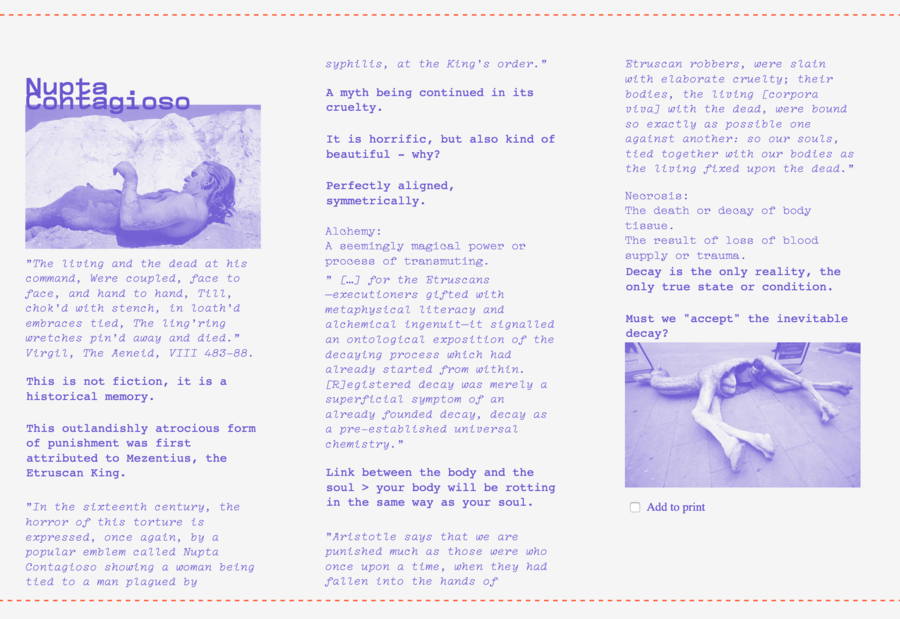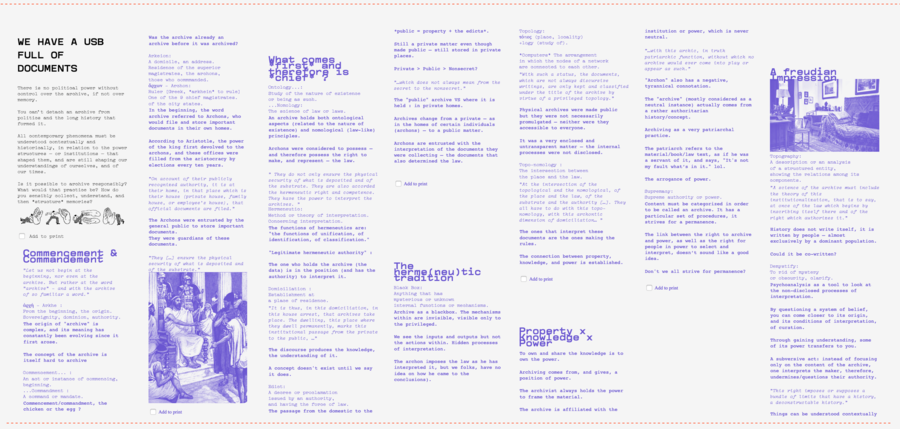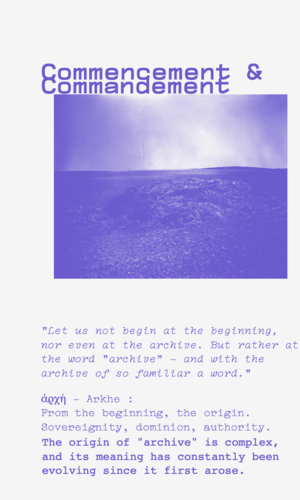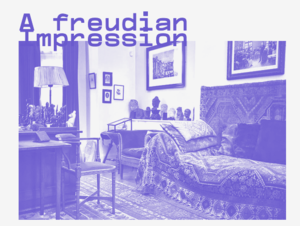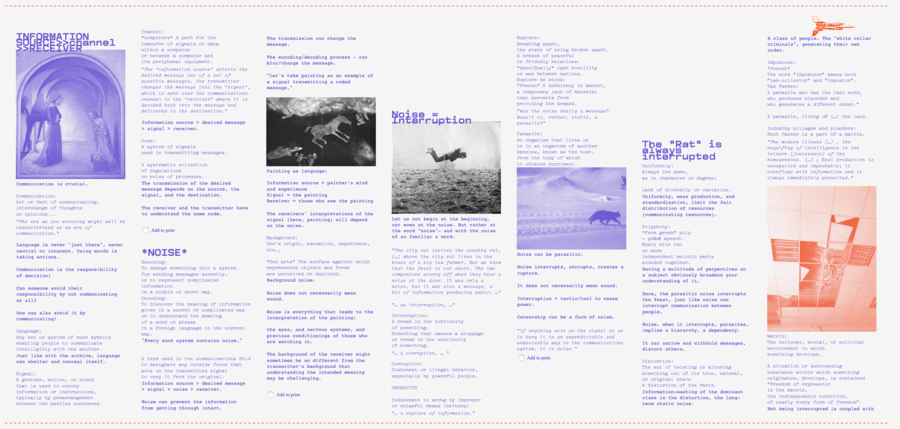User:Claxhanson/methods2: Difference between revisions
Claxhanson (talk | contribs) |
Claxhanson (talk | contribs) |
||
| Line 30: | Line 30: | ||
=Structure= | =Structure= | ||
<div style="background-color: f5f5f5;"> | <div style="background-color: f5f5f5;"> | ||
Revision as of 17:32, 15 August 2020
M******** PRESS BLOCKS
Revolutions are built in collectivity.
What is it to be in the position of publishers in period of conflict ?
Assuming a collective position within the group, for the good of the group ?
Somehow manufacturing conditions of urgency in an evironement of relative safety can highlight a certain sense of respect for the labours of urgency that we are archiving.
The "Swarms" were the result of three intensive seesions, from each of which a fully wrapped up publication had to come out.
These sessions were 3 session of Slow reading, where we opened a collective pad to gather random thoughts, comments, questions and ideas. We then used OSP's prototyping project "Ether2HTML", to design, wrap, and print them on the spot !
In the light of their structural assets
Parts of these Swarms found their way all around this website as bits of conversation and collective writings, that have accompagnied us all along the process —
a handfull of unreferenced snippets from a lot of different places, conversations.
This work was a work of assemblage, of collage, to create stand alone chapters that would then be sparkled around the web site, read independently or in relation to some of the tools and methods we've used during the project.
I thought it was nice, this idea that these Swarms were like carbage, from multiple writers and speakers — Carbage being bits of leftover cloth that tailors keep for future reuse.
For this to be possible, they had to be reorganised in chapters that would make sens as stand alone, to escort the tools and methods, and lead to a bunch of relevant (or not) associations as they unfold. One of our first references for the Website was the "Whole earth catalog".
Structure
ARCHIVE FEVER
There is no political power without control over the archive, if not over memory.
You can’t detach an archive from politics and the long history that formed it.
All contemporary phenomena must be understood contextually and historically, in relation to the power structures — or institutions — that shaped them, and are still shaping our understandings of ourselves, and of our times.
Is it possible to archive responsibly?
What would that practice be? How do you sensibly collect, understand, and then *structure* memories?
https://pad.xpub.nl/p/archivefever.md
"Let us not begin at the beginning, nor even at the archive. But rather at the word "archive" - and with the archive of so familiar a word."
ἀρχή - Arkhe : From the beginning, the origin. Sovereignity, dominion, authority.
- The origin of "archive" is complex, and its meaning has constantly been evolving since it first arose.
- The concept of the archive is itself hard to archive
Commencement... : An act or instance of commencing, beginning.
...Commandment : A command or mandate.
- Commencement/commandment, the chicken or the egg ?
- Was the archive already an archive before it was archived?
Arkeion: A domicile, an address. Residence of the superior magistrates, the archons, those who commmanded.
ἄρχων - Archon: Ruler [Greek, *arkhein* to rule] One of the 9 chief magistrates. of the city states.
- In the beginning, the word archive referred to Archons, who would file and store important documents in their own homes.
- According to Aristotle, the power of the king first devolved to the archons, and these offices were filled from the aristocracy by elections every ten years.
"On account of their publicly recognized authority, it is at their home, in that place which is their house (private house, family house, or employee's house), that official documents are filed."
- The Archons were entrusted by the general public to store important documents.
- They were guardians of these documents.
Ontology...: Study of the nature of existence or being as such.
...Nomology: The science of law or laws.
- An archive holds both ontological aspects (related to the nature of existence) and nomological (law-like) principles.
- Archons were considered to possess — and therefore possess the right to make, and represent — the law.
" They do not only ensure the physical security of what is deposited and of the substrate. They are also accorded the hermeneutic right and competence. They have the power to interpret the archives. "
Hermeneutic: Method or theory of interpretation. Concerning interpretation.
- The functions of hermeneutics are: "the functions of unification, of identification, of classification."
- "Legitimate hermeneutic authority" :
The one who holds the archive (the data) is in the position (and has the authority) to interpret it.
Domiciliation : Establishment at a place of residence.
"It is thus, in this domiciliation, in this house arrest, that archives take place. The dwelling, this place where they dwell permanently, marks this institutional passage from the private to the public, …"
- The discourse produces the knowledge, the understanding of it.
- A concept doesn't exist until we say it does.
Edict: A decree or proclamation issued by an authority, and having the force of law.
- The passage from the domestic to the *public = property + the edicts*.
- Still a private matter even though made public — still stored in private places.
- Private > Public > Nonsecret?
Black Box: Anything that has mysterious or unknown internal functions or mechanisms.
- Archive as a blackbox. The mechanisms within are invisible, visible only to the privileged.
- We see the inputs and outputs but not the actions within. Hidden processes of interpretation.
- The archon imposes the law as he has interpreted it, but we folks, have no idea on how he came to the conclusions).
Topology: τόπος (place, locality) +logy (study of).
- Computers* The arrangement
in which the nodes of a network are connected to each other.
"With such a status, the documents, which are not always discursive writings, are only kept and classified under the title of the archive by virtue of a privileged topology."
- Physical archives were made public but they were not necessarily promulgated — neither were they accessible to everyone.
- It was a very enclosed and untransparent matter — the internal processes were not disclosed.
Topo-nomology : The intersection between the place and the law.
"At the intersection of the topological and the nomological, of the place and the law, of the substrate and the authority […]. They all have to do with this topo-nomology, with this archontic dimension of domiciliation… "
- The ones that interpret these documents are the ones making the rules.
- The connection between property, knowledge, and power is established.
- To own and share the knowledge is to own the power.
- Archiving comes from, and gives, a position of power.
- The archivist always holds the power to frame the material.
- The archive is affiliated with the institution or power, which is never neutral.
"…with this archic, in truth patriarchic function, without which no archive would ever come into play or appear as such."
- "Archon" also has a negative, tyrannical connotation.
- The "archive" (mostly considered as a neutral instance) actually comes from a rather authoritarian history/concept.
- Archiving as a very patriarchal practice.
- The patriarch refers to the material/book/law text, as if he was a servant of it, and says, "It's not my fault what’s in it." lol.
- The arrogance of power.
Supremacy: Supreme authority or power.
- Content must be categorized in order to be called an archive. It has a particular set of procedures, it strives for a permanence.
- The link between the right to archive and power, as well as the right for people in power to select and interpret, doesn’t sound like a good idea.
- Don't we all strive for permanence?
Topography: A description or an analysis of a structured entity, showing the relations among its components.
"A science of the archive must include the theory of this institutionalization, that is to say, at once of the law which begins by inscribing itself there and of the right which authorizes it."
- History does not write itself, it is written by people — almost exclusively by a dominant population.
- Could it be co-written?
Demystify: To rid of mystery or obscurity, clarify.
- Psychoanalysis as a tool to look at the non-disclosed processes of interpretation.
- By questioning a system of belief, you can come closer to its origin, and its conditions of interpretation, of curation.
- Through gaining understanding, some of its power transfers to you.
- A subversive act: instead of focusing only on the content of the archive, one interprets the maker, therefore, undermines/questions their authority.
"This right imposes or supposes a bundle of limits that have a history, a deconstructable history."
- Things can be understood contextually and historically, in relation to power structures and institutions that shaped their own concepts.
- We can’t detach the archive from politics and the long history behind it.
- History, for example, being so very masculine and therefore the archive being so biased and excluding.
- Also, the concept of the archive is biased towards written cultures and languages.
The fact that for a really long time, and still today, it is harder to archive oral cultures, and there
PARASITES
Communication is crucial.
Language is never just there, never neutral, nor innocent. Words are actions.
Having a multitude of perpectives on a subject will broaden your understanding of it:
iterrupting can be a tactic, a tool to narrow down the panorama, and shape it to their interests.
Not being interrupted is a priviledge, a luxury.
If you are constantly being interrupted, you will have have to deviate to be heard.
Propaganda and censorship are constantly trying to limit the fair distribution of communicating ressources. Authority controls resources, and will try to take down any content advocating for political dissidence or discordance. Who gets to articulates the laws? Who articulates the memory of it ? Don’t forget this.
How do you publish in times of such political urgency ? What do we have to protect ourselves about ? Who from ? For how long ? And what tools do we need to do it ?
https://pad.xpub.nl/p/swarm02.md
- Communication is crucial.
Communication: Act or fact of communicating. Interchange of thoughts or opinions...
"The era we are entering might well be characterized as an era of communication."
- Language is never "just there", never neutral or innocent. Using words is taking actions.
- Communication is the responsibility of decision!
- Can someone avoid their responsibility by not communicating at all?
- One can also avoid it by communicating!
Language: Any set or system of such symbols enabling people to communicate intelligibly with one another.
- Just like with the archive, language can shelter and conceal itself.
Signal: A gesture, action, or sound that is used to convey information or instructions, typically by prearrangement between the parties concerned.
Channel:
- computers* A path for the
transfer of signals or data within a computer or between a computer and its peripheral equipment.
"The *information source* selects the desired message out of a set of possible messages, the transmitter changes the message into the
- signal*, which is sent over the communications channel to the
- receiver* where it is decoded back into the message and delivered to
the destination."
- Information source > desired message > signal > receiver.
Code: A system of signals used in transmitting messages. A systematic collection of regulations or rules of procedure.
- The transmission of the desired message depends on the source, the signal, and the destination.
Encoding: To change something into a system for sending messages secretly, or to represent complicated information in a simple or short way.
Decoding: To discover the meaning of information given in a secret or complicated way or to understand the meaning of a word or phrase in a foreign language in the correct way.
A term used in the communications field to designate any outside force that acts on the transmitted signal to vary it from the original.
- Information source > desired message > signal + noise > receiver.
- Noise can prevent the information from getting through intact.
- The transmission can change the message.
- The encoding/decoding process - can blur/change the message.
Painting as language:
- Information source = painter’s mind and experience
- Signal = the painting
- Receiver = those who see the painting
- The receivers' interpretations of the signal (here, painting) will depend on the noise.
Background: One's origin, education, experience, etc.,
- fine arts* The surface against which
represented objects and forms are perceived or depicted.
- Background noise.
- Noise does not necessarily mean sound.
Noise is everything that leads to the interpretation of the painting:
the eyes, and nervous systems, and previous conditionings of those who
are watching it.
- Let us not begin at the beginning, nor even at the noise. But rather at the word "noise"- and with the noise of so familiar a word.
"The city rat invites the country rat, […] where the city rat lives in the house of a big tax farmer. But we know that the feast is cut short. The two companions scurry off when they hear a noise at the door. It was only a noise, but it was also a message, a bit of information producing panic: …"
"… an interruption, …"
Interruption: A break in the continuity of something. Something that causes a stoppage or break in the continuity of something.
"… a corruption, … "
Corruption: Dishonest or illegal behavior, especially by powerful people. DEPRAVITY Inducement to wrong by improper or unlawful means (bribery)
"… a rupture of information."
Rupture:Breaking apart, the state of being broken apart.
A breach of peaceful or friendly relations.
Rupture de stock: French, A deficiency in amount, a temporary lack of material that prevents from providing the demand.
"Was the noise really a message? Wasn't it, rather, static, a parasite?"
Parasite: An organism that lives on or in an organism of another species, known as the host, from the body of which it obtains nutrient.
- Noise can be parasitic.
- Noise interrupts, corrupts, creates a rupture.
- It does not necessarily mean sound.
- Interruption = tactic/tool to cease power.
- Censorship can be a form of noise.
"If anything acts on the signal so as to bury it in an unpredictable and undesirable way in the communications system, it is noise."
Uniformity: Always the same, as in character or degree; Lack of diversity or variation.
- Uniformity, mass production, and standardisation, limit the fair distribution of resources (communicating resources).
Polyphony: from greek, poly + phōnē speech. Music with two or more independent melodic parts sounded together.
- Having a multitude of perpectives on a subject obviously broadens your understanding of it.
- Here, the parasitic noise interrupts the feast, just like noise can interrupt communication between people.
- Noise, when it interrupts, parasites, implies a hierarchy, a dependency.
- It can narrow and withhold messages, distort others.
Distortion: The act of twisting or altering something out of its true, natural, or original state. A distortion of the facts.
- Information-washing of the dominant class is the distortion, the long-term static noise.
- A class of people. The "white-collar criminals", generating their own order.
Tax Farmer: A parasite who has the last word, who produces disorder and who generates a different order." A parasite, living off […] the land. Industry pillages and plunders: Such farmer is a part of a matrix.
"The modern illness […] , the engulfing of intelligence in the leisure [jouissance] of the homogeneous. […] ; Real production is unexpected and improbable; it overflows with information and is always immediately parasited."
Matrix:
The cultural, social, or political
environment in which
something develops.
A situation or surrounding
substance within which something
originates, develops, is contained
Idiosyncrasies: A structural or behavioral characteristic peculiar to an individual or group.
"The noise that tends to disrupt the signal can take many forms. It can be the quality of the light, or the color of the light, or the prejudices of the viewer, or the idiosyncrasies of the painter."
Propaganda: Information, ideas, or rumors deliberately spread widely to help or harm a person, group, movement, institution, nation, etc.
- Propaganda and censorship as a constant, parasitic noise.
- Constant struggle, a fight for position.
- Relation between information and energy.
"Professional archivists have the power and authority to construct a dominant narrative on virtually any topic. Unfortunately, the archival world is built on a legacy of colonialism, appropriation, and community disenfranchisement. The power imbalance between archivists and the marginalized communities they often document leads to the dissemination of inaccurate and harmful accounts." Reference:
- Political urgency.
- Authority controls resources.
- For an oppressor, distortion would be the noise of those who disagree with them.
- Political dissidents create the noise that interrupt the feast of oppressors.
- Resistance movements can generate a counter/ a different order.
- From beyond this point and in this chain, everybody becomes a parasite.
Wikipedia edit wars: Conflict of interest or non-neutrality. When Wikipedia administrators/editors keep going back and fourth with statements in Wikipedia due to a lack of source. This creates a bias towards statements that align with the government's views, since content published by dissidents are stategically and systematically censored and taken off the internet.
CORPSE BRIDGE
Decay is the only reality, the only true state or condition.
Must we "accept" the inevitable decay?
When ideas decay, history is boud to repeat itself.
An idea must be embodied, to be externalized to be passed onto different levels and states. Does the decay of the body necessarily lead to the decay of the thought? How do you counter the loss — or censorship — of the materiality that constitutes a body.
You can’t prevent a body from decaying, but you can engage in the perpetuation of its the intellect.
Intellect can remain through other bodies.
Intellect can be recorded, can be documented.
How can a soul remain when it is substracted from its body?

